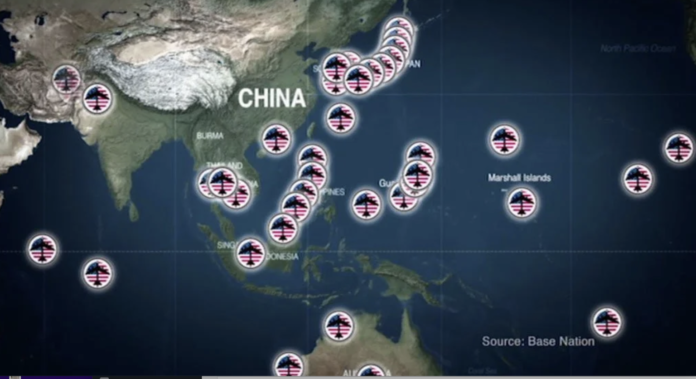Shangri-La Dialogue Update – Tri-Lateral Statement
Last week’s report discussed the Shangri-La Dialogue; and this week we noted that the Australian Defence Minister Richard Marles, Japanese Minister of Defense Hamada Yasukazu and the United States Secretary of Defence Lloyd Austin conducted a Trilateral Defence Ministerial Meeting at the Shangri-La meeting and released a joint statement.
The statement confirmed the three nations commitment to working together on Pacific security issues and the key points were:
- Noting that each nation has recently conducted strategic security reviews and that their outcomes are aligned and mutually supporting.
- That the United States, Australia and Japan are committed to achieving greater military inter-operability. Specifically, that Japan and Australia will work together to enhance their long-range strike capabilities. Both nations are investing in Tomahawk cruise missiles and the opportunity to share knowledge and experience contributes to bringing the system into service.
- The nations expressed concerns about tensions in the South China Sea and freedom of navigation in the Taiwan Strait.
- Further, the nations condemned North Korean nuclear weapons and ballistic missile research, development and testing.
This meeting is another example of the increasing competitiveness of the Pacific region. Australia and Japan both significantly increased defence spending this year and are investing in the technology required for inter-operability with the United States. Essentially, that one day soon American Marines will be able to call for fire and that the cruise-missile that arrives to hit the target they have found may just as easily come from an AUKUS submarine or a Japanese destroyer as from an American unit. Likewise, that Japanese and Australian soldiers will be able to seamlessly operate with American forces.
Inter-operability with the United States requires a significant investment of money and human resources. The fact that Japan and Australia are making this investment demonstrates the concerns that these nations have for security in the region.
AUKUS and smaller Pacific nations
Australia and the United States commitment to competition with China; or deterrence depending on your point of view inevitably creates a split in the Pacific because some smaller nations do not support this competition. For instance, this week at the welcome ceremony for the new Secretary General of the Pacific Island’s Forum, Fiame Naomi Mataafa, Prime Minister of Samoa discussed the situation regarding Sino-American competition in the Pacific.
Making it clear that her intent is that the Pacific remains free of military competition. “More than ever, there is increased interest and jostling for attention in our blue Pacific region thus creating a very crowded and complex geopolitical landscape for all of us, and our regional architecture,” she said referencing the increasing competition in the region. Her words echoing similar statements made recently by other Pacific leaders, especially after the AUKUS deal was announced.
It seems unlikely that this situation will change. Pacific nations have long been proud of their anti-nuclear stance ratified in the Treaty of Rarotonga and of their commitment to peaceful co-existence. Preferring instead to focus on issues like climate change adaptation.
Last week’s report that Papua New Guinea had not signed a planned defence agreement with Australia is probably indicative of similar local concerns in this nation. Essentially, many smaller Pacific nations are concerned about getting drawn into potential Sino-American conflict. Powers like the United States, United Kingdom and Australia need to consider the peaceful aspirations of smaller Pacific nations if they intend to build strong and lasting security alliances in the region.
China, Russia, South Korea and Japan – Standoff in the air
On 6 June, 2023 South Korean and Japanese fighter planes scrambled to intercept Chinese and Russian aircraft operating over the East China Sea and Sea of Japan. The aircraft entering South Korean and Japanese air defence identification zones without identifying themselves or stating their intentions.
This type of activity was a hallmark of the Cold War in Europe, both sides regularly testing each other’s air defence capabilities by triggering and then timing interceptions. The aim being to build up a picture of the opposition’s air defence capability including its weaknesses. In this case South Korea protested diplomatically, and China’s Ministry of Defence responded that the activity was part of a cooperation deal with Russia that was agreed in 2019.
In my opinion, this activity is not unusual but is interesting because it involves Russia and China working together. Russia, likely keen to demonstrate that it is still a force in world geo-politics by remaining active in the Pacific. From China’s perspective working with Russia plays to their diplomatic narrative that the ‘world order’ is not a unipolar order centred on the United States; but rather a multi-polar order with China and Russia providing an acceptable alternative world view to America’s liberal democracy and capitalism. A narrative that will become increasingly common in the Pacific as Sino-American competition increases.
Atlantic Declaration and its impact in the Pacific
Last week, the United States and the United Kingdom announced the Atlantic Declaration for a Twenty-First Century United States – United Kingdom Economic Partnership. A tightly focussed statement of economic intent that has some significant defence and security impacts. The declaration focuses on the partner nations working together to retain leadership in the development of emerging technologies in areas like defence, AI and green energy. Further, it aims to help support both nation’s industrial bases to become more secure and resilient. Including steps to guarantee access to the minerals required for modern tech like semi-conductors.
The Atlantic Declaration is a strong signal of the deepening relationship between the United States and United Kingdom. A relationship that is already influencing the Pacific through the AUKUS submarine deal. A deal that in turn will benefit from the industrial and technological ‘know how’ the Atlantic Declaration seeks to protect and develop further. And; as time progresses more military tech will be developed using this deal’s arrangements.
The deal seeks to protect tech research, production and industry. It could be interpreted as a hardening of diplomatic attitudes and a return to an adversarial economic policy reminiscent of the Cold War. Prime Minister Sunak openly stating that “Countries like China and Russia are willing to manipulate and exploit our openness, steal our intellectual property, use technology for authoritarian ends or withdraw crucial resources.” The Atlantic Declaration aims to counter these threats and retain the partners competitive advantage by supporting and strengthening protection of their military – tech – industrial complexes.
Already, the United States and the United Kingdom are forming a power block in the Pacific and the White House’s Atlantic Declaration briefing statement confirms the partners commitment to “…the indivisibility of security in the Euro-Atlantic and the Indo-Pacific and other regions.” Or in simple terms that the Indo-Pacific region is vital to the United States and United Kingdom’s security. Hence, their desire to create and support collective security alliances in the Pacific. However, it seems likely that the deal’s hardening of attitudes will carry over into the partner nation’s Pacific diplomacy.
The full White House briefing on the deal can be found here –
Fiji to re-assess Chinese police training deal
Prime Minister of Fiji, Sitiveni Rabuka speaking at a press conference in New Zealand last week announced that his government will re-consider a police training relationship that it has with China. The arrangement dates to 2011 and allows Fijian police officers to train in China. Later, in 2013 the arrangement was expanded to include military personnel.
Since taking power, Rabuka has progressively distanced Fiji from Chinese influence, and this announcement appears to continue this policy. Rabuka is from a generation that had close ties with the United States and likely sees that Pacific competition is unavoidable so may be choosing sides early. A decision that secures more diplomatic influence for Fiji within the United States led network of collective security alliances developing in the Pacific.
Ben Morgan is a bored Gen Xer and TDBs military blogger





This Pentagon Radio broadcasting from Washington.
The Chinese police are just the PLA in different uniforms. And like the PLA, its primary role is to protect and enforce the will of the CCP Chinese Criminal Party, not Chinese citizens.